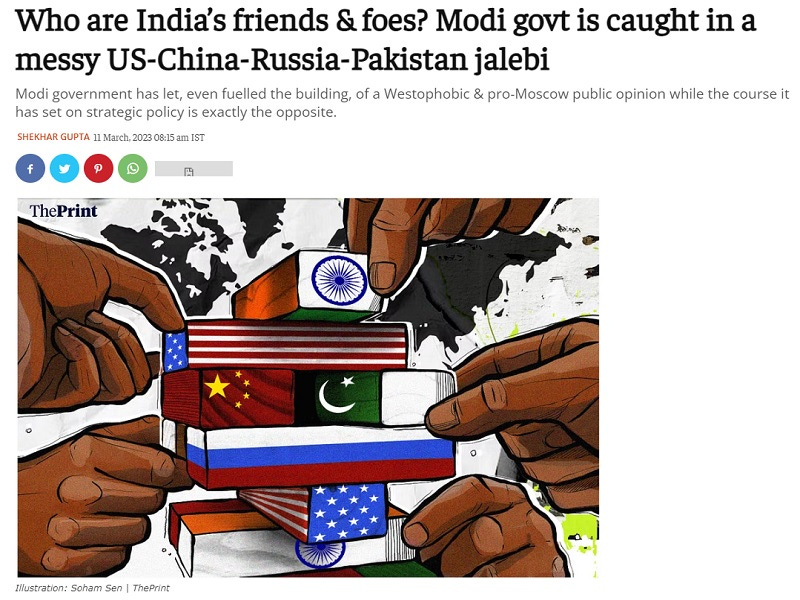Korybko To Shekhar Gupta: India’s Geostrategic Situation Isn’t As Messy As You Make It Seem
Far from being irresponsible and reckless like ThePrint’s Editor-in-Chief Shekhar Gupta portrays it as, India’s grand strategy is responsible and ensures its enduring interests.
Shekhar Gupta, who’s the Editor-in-Chief of India’s popular online media outlet ThePrint, shared his thoughts about India’s geostrategic situation in his latest article titled “Who are India’s friends & foes? Modi govt is caught in a messy US-China-Russia-Pakistan jalebi”. The gist of his piece is that India is in a messy geostrategic situation largely of Prime Minister Modi’s own making. He argues that its present balancing act isn’t just clumsy, but unsustainable and ultimately disadvantageous to national security.
Gupta’s personal assessment is that “Russia cannot last more than a few weeks in its war with the West (via Ukraine) without China’s help” since its economy would supposedly collapse if the People’s Republic cut it off. This supposedly places Russia at China’s mercy, which in turn endangers Indian interests in the event that those two Asian Great Powers seriously clash with one another. He’s worried that Beijing would force Moscow to take its side over Delhi’s in such a scenario.
The Editor-in-Chief then transitions to referencing the recent Raisina Dialogue in which Russian Foreign Minister Sergey Lavrov participated. That top diplomat reminded his hosts that their strategic partnership is incomparable with any of India’s others since independence, but Gupta felt it was an inaccurate description. His reason is that the removal of a Soviet-era mutual security guarantee from a 1990s-era partnership pact and close Indo-US ties contest Lavrov’s characterization.
Gupta also challenged the Russian Foreign Minister’s claim at that event that the Global South at large is practicing a more non-aligned foreign policy by citing the fact that the vast majority still voted for a recent anti-Russian resolution. He then segued along to talking about the strength of Indo-US ties in recent years, arguing that the US is a more reliable partner for his country with whom India stands to incomparably benefit much more than compared to Russia. He then ends on the following note:
“The Modi government now finds itself in this deepest of contradictions of its own making. It has let, even encouraged, the building of a public opinion that’s Westophobic and pro-Russia even as the course it has set on strategic policy is exactly the opposite. It is uncharacteristic of Modi, who usually believes in aligning his policies and public opinion. At some point soon, course correction might be needed on one or the other. In my view, more likely on public opinion. Today’s contradictions are unsustainable.”
With all due respect for Gupta’s prominent public profile, the grounds upon which he made his arguments are flimsy at best and false at worst. While China remains Russia’s top trading partner, the latter isn’t wholly dependent on the People’s Republic. It’s also unrealistic to imagine that Beijing would weaponize their massive economic ties by threatening to unilaterally curtail or even cut them off at a moment’s notice as pressure upon Moscow to take its side over Delhi’s in any potential conflict.
Regarding his reaction to Lavrov’s remarks at the Raisina Dialogue, India nowadays prefers to multi-align between Great Powers instead of make mutual security commitments to any single one. Neither the Russian nor US dimension of its geostrategic balancing act in the New Cold War is aimed against either of them or any other third party. As for the Global South’s voting record at the UN, Gupta left out that Lavrov informed everyone of how the US reportedly threatened some countries’ representatives.
He also made no mention of the fact that only the US-led West’s Golden Billion, which in this context includes their non-Western partners like Japan, have complied with that declining unipolar hegemon’s anti-Russian sanctions demands. The vast majority of the international community has refused, hence why the New York Times recently admitted that this policy failed just like the one to “isolate” Russia did as well. These observations extend credence to Lavrov’s characterization and challenge Gupta’s.
The last point to make is that it’s factually untrue that Prime Minister Modi has “encouraged the building of a public opinion that’s Westophobic”. Surveys from India’s prestigious Observation Research Foundation, the US-based Morning Consult global business intelligence company, and the European Council on Foreign Relations confirm the strength of Russian-friendly sentiment in society, but they also show how much Indians appreciate the West too. Gupta’s claim is therefore a gross exaggeration.
Considering these counterpoints, India’s geostrategic situation isn’t as messy as he makes it seem. In fact, it’s actually pretty clear-cut and stable. Prime Minister Modi’s approach arguably represents a new model of global engagement that could inspire the rest of the Global South to follow his country’s lead in order to maximize the benefits of their respective balancing acts. Far from being irresponsible and reckless like Gupta portrays it as, India’s grand strategy is responsible and ensures its enduring interests.




